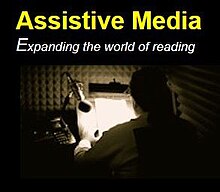Assistive Media, Inc. is a nonprofit Internet-based reading service to serve people with visual and reading impairments.[1]

Assistive Media was founded in Ann Arbor, Michigan, in 1996 by David Erdody as a 501(c)(3) nonprofit organization.[2][3] According to Erdody, it was inspired by his father's diagnosis of diabetic retinopathy, an avid reader of The New Yorker magazine and audiobooks.[1][4] He considers Duvall Hecht's Books on Tape (company) and the narration style of Grover Gardner to have had a major influence on his admiration for the audiobook format [1] . Utilizing volunteer readers and work-study students from the University of Michigan,[2][3] Assistive Media began producing and distributing spoken-word recordings of otherwise inaccessible materials on audio cassette to The Washtenaw County, Michigan Library for the Blind and Physically Disabled, a participating library of the National Library Service for the Blind and Physically Handicapped of the Library of Congress.[3]
In 1998, with the advent of online digital audio formats such as RealAudio, direct distribution of recordings shifted to the Assistive Media website and has received praise from the at-large online disabled community and also from David McCullough, Mark Cuban, and John Perry Barlow.[4][5] In 1999, Assistive Media was awarded RealNetworks, Inc.'s Progressive Streamers Award as the best nonprofit streaming web site of the year over Peter Gabriel's Witness (organization).[1][6]
Assistive Media has produced spoken-word recordings of works of nonfiction literature and long-form journalism from The Atlantic, Granta, Harper's Magazine, The New York Review of Books, The New Yorker, Scientific American, and Wired.[4] It is considered one of the longest continuously running Internet-based nonprofit services. In 2011, Assistive Media began recording unabridged full-length books of biographical, historical, and contemporary nonfiction for online delivery to libraries that specialize in books for the blind [2]. Assistive Media is also affiliated with LifeScienceAudio.com.
References[edit]
- ^ a b c "Disabilities: On-line readings". Detroit Free Press. June 4, 1999. Retrieved April 20, 2018 – via Newspapers.com
 .
.
- ^ a b Nesbit, Joanne (June 1, 2004). "Spotlight: The gift of sound". The University Record Online. University of Michigan. Retrieved April 20, 2018.
- ^ a b c "About us". Assistive Media. Retrieved April 20, 2018.
- ^ a b c Clausing, Jeri (June 30, 1998). "New Media Helps Visually Impaired Hear Old Media". The New York Times. Retrieved April 20, 2018.
- ^ Kaplan, Karen (February 1, 1999). "A Web of Dumb Laws and Paper Clips". Los Angeles Times. Retrieved April 20, 2018 – via Newspapers.com
 .
.
- ^ "Record-Setting RealNetworks Conference & Exhibition '99" (Press release). Seattle: RealNetworks. May 17, 1999. Archived from the original on June 9, 2002.
External links[edit]
- Assistive Media Official website
- LifeScienceAudio.com Official website
- Assistive Media on Charity Vault
Well, that’s interesting to know that Psilotum nudum are known as whisk ferns. Psilotum nudum is the commoner species of the two. While the P. flaccidum is a rare species and is found in the tropical islands. Both the species are usually epiphytic in habit and grow upon tree ferns. These species may also be terrestrial and grow in humus or in the crevices of the rocks.
View the detailed Guide of Psilotum nudum: Detailed Study Of Psilotum Nudum (Whisk Fern), Classification, Anatomy, Reproduction